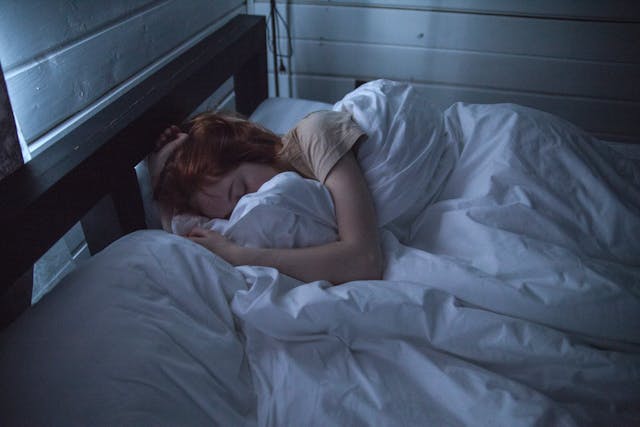The Hidden Avalanche: How Short-Term Sleep Loss Triggers Major Anxiety
You know the feeling. One bad night of sleep and the whole day feels off. You’re foggy, edgy, and maybe even more emotional than usual.
That’s not just in your head.
Science backs it up. Even a single night of disrupted sleep can push your anxiety levels through the roof. Here’s why:
- Poor sleep throws off the balance between your brain’s emotional center (the amygdala) and your rational brain (the prefrontal cortex). When those two stop working together well, anxiety can spike fast.
- Studies show that even mild sleep deprivation makes people more emotionally reactive and prone to worry.
- In one meta-analysis, healthy adults experienced a sharp increase in anxiety symptoms after short-term sleep loss. No diagnosis needed—just sleep disruption alone was enough.
You don’t need to have chronic insomnia to feel the effects. Even one night can rattle your nervous system.
Insomnia Isn’t Just About Not Sleeping
When we talk about insomnia, most people imagine someone lying awake, staring at the ceiling for hours. But insomnia shows up in a lot of ways:
- Trouble falling asleep
- Waking up frequently
- Not feeling rested even after sleep
- Worrying about sleep
Insomnia isn’t just frustrating. It directly fuels anxiety.
- About 10 to 15 percent of adults experience short-term insomnia.
- Around one-third of people globally are unhappy with their sleep.
- Between 70 to 80 percent of people with anxiety disorders report insomnia symptoms.
These two conditions are deeply connected. One feeds the other. You can’t fix the anxiety without addressing the sleep—and vice versa.
How Short Sleep Creates Big Emotional Stress
Think of it like a volume knob on your nervous system. Sleep turns it down. Lack of sleep cranks it up.
- In a study of over 270,000 adults, those who slept six hours or less were 2.5 times more likely to experience frequent mental distress.
- Even if you technically “sleep,” fragmented sleep—where your brain keeps waking up briefly—can still throw your nervous system into chaos.
- Poor sleep activates the stress-response system, increasing cortisol and adrenaline. You’re essentially stuck in fight-or-flight mode.
Sleep affects everything from how you think to how you feel to how you relate to others. And when it goes missing, your ability to cope shrinks fast.
A Frustrating Cycle of Sleep Anxiety and Fatigue
One of the worst things about sleep anxiety, lack of sleep and feeling perpetually exhausted is that, being exhausted and sleep deprived leads to more anxiety including sleep anxiety.. which makes it more difficult to go to sleep, stay asleep and get restful, restorative sleep.
Yes, you read that right: Lack of sleep creates anxiety. Anxiety creates lack of sleep.
So what is a person to do?

Sleep Apnea: The Anxiety Trigger You Might Not Know You Have
Sleep apnea is one of the most overlooked causes of anxiety.
This disorder causes your airway to collapse during sleep, cutting off oxygen and forcing your body to wake up repeatedly to breathe. Many people don’t even know it’s happening.
- About one-third of adults have some form of sleep apnea, but most are never diagnosed.
- Among those with moderate to severe sleep apnea, anxiety symptoms are present in about 32 to 44 percent of cases.
- These repeated oxygen drops, combined with micro-awakenings, create an ongoing stress response that doesn’t stop when the sun comes up.
Even if you’re not gasping awake, your brain still senses the danger and stays alert. That means higher cortisol, lower focus, and constant fatigue—all of which worsen anxiety.
Why Most People Don’t Get Diagnosed for Sleep Apnea
This condition is often missed for a few reasons:
- It’s usually silent. If you sleep alone, you might not hear yourself snore or stop breathing.
- Symptoms can mimic anxiety or depression. You feel tired, irritable, or foggy—but doctors might focus on mental health and not ask about your sleep.
- Many people with sleep apnea are not overweight, so they get overlooked. The stereotype that apnea only happens in older, heavier men isn’t accurate.
Because sleep apnea is underdiagnosed, many people are walking around thinking they’re “just anxious” when in reality, their brain is under-slept and under-oxygenated every night.
The Way Out Starts With Sleep
You don’t have to stay stuck in this cycle. In fact, improving your sleep is one of the most powerful ways to reduce anxiety symptoms—especially if nothing else has worked.
Here’s what helps:
1. Take Insomnia Seriously
Even short-term insomnia can be a red flag. Don’t wait for it to become chronic. Cognitive behavioral therapy for insomnia (CBT-I), sleep hygiene, and hypnotherapy all help.
2. Consider a Sleep Study
If you wake up tired, snore, or feel anxious for “no reason,” get checked for sleep apnea. A simple home sleep test can change your life.
3. Track Your Sleep and Mood
Keep a notebook or use an app to track how many hours you sleep and how you feel emotionally the next day. Patterns will start to show you the connection.
4. Understand It’s Physical, Not Personal
Anxiety isn’t always about trauma or mindset. Sometimes it’s about what your body is missing—and restful sleep might be the missing piece.
5. Try Alternative, Low-Risk, Low-Cost Treatments
Many people report that deep breathing or breathwork can help them sleep sooner and more soundly and stay asleep longer. Others suggest meditation or tapping to help them sleep. There are a lot of options out there that help at least some people sleep better.
Key Statistics to Know
- Around 10 to 15 percent of adults struggle with short-term insomnia.
- 70 to 80 percent of people with anxiety also report poor sleep.
- Sleeping six hours or less increases your risk of mental distress by 2.5 times.
- Roughly 32 to 44 percent of sleep apnea sufferers have anxiety.
- As many as 80 percent of people with sleep apnea remain undiagnosed.
If you’ve been feeling on edge, wired, or constantly overwhelmed, your brain might just need rest—real, restorative rest.
Final Thoughts: You’re Not Broken. You Might Just Be Tired.
If you’ve tried mindset work, therapy, or even medication but still feel anxious, it’s time to look at your sleep.
Sleep is not a luxury. It’s not a nice-to-have. It is foundational. Without it, your body cannot regulate stress, your brain cannot stay focused, and your emotions cannot stabilize.
Whether it’s insomnia or undiagnosed sleep apnea, poor sleep rewires your entire nervous system toward survival.
But you can change that.
Start small. Get curious about your sleep. Ask questions. Consider a sleep study. Explore natural support like guided hypnotherapy or CBT-I.
When your body gets the rest it needs, your mind starts to follow. Peace doesn’t have to be forced—it can rise naturally from a well-rested brain.





